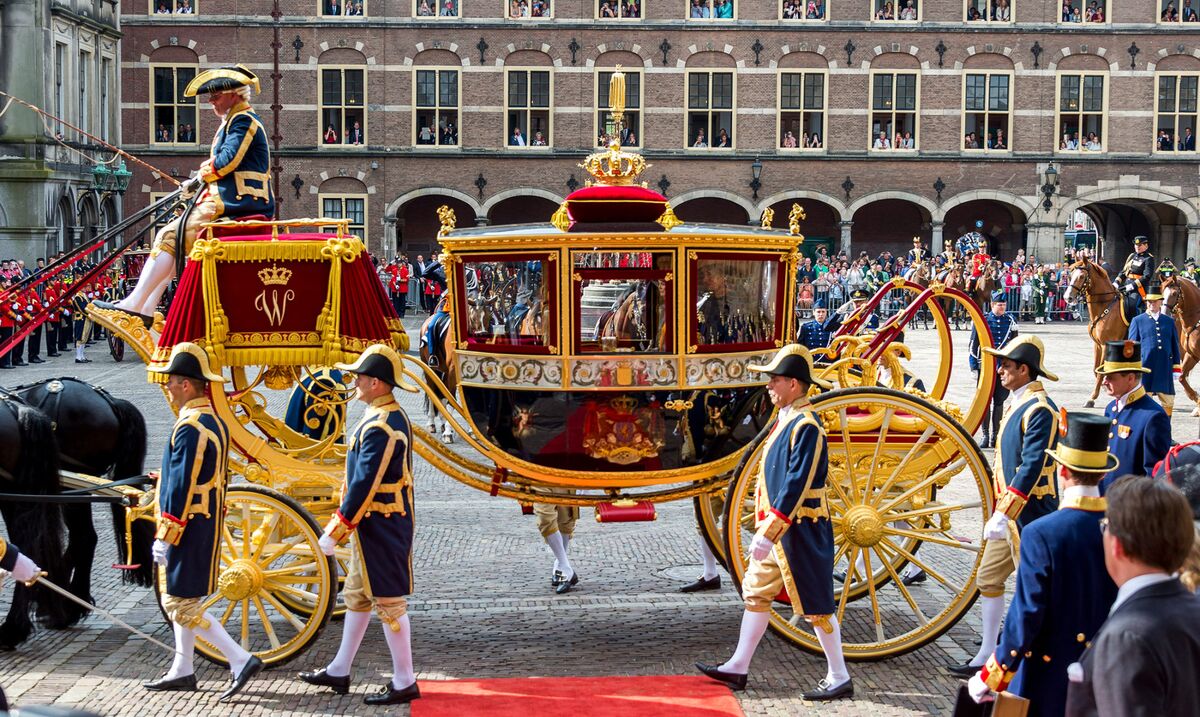
King Willem-Alexander and Queen Maxima of The Netherlands arrive at the Ridderzaal in The Hague, on Sept 20, 2016.
The Dutch economic machine is roaring, government or not.
As the caretaker government of Prime Minister Mark Rutte prepares to unveil its 2018 budget on Tuesday, the country is growing at its fastest clip in a decade.
With a new government yet to be formed more than 185 days after the Dutch general elections in March -- the second-longest such period since World War II -- many see the strong performance as an indication that systems put in place after Europe’s debt crisis in 2008 are helping shelter the country from the vagaries of international events and political uncertainty at home.
“Does it matter a lot that we have a caretaker government? No, honestly, it doesn’t,” said ING Groep NV Chief Economist Marieke Blom. “For now, the economy is in good shape. Although there are things that can be improved, I don’t really believe they’re very urgent.”
Trade concerns after the election of Donald Trump in the U., the Brexit vote in the U. and uncertainty over the vote in France barely made a dent on the Dutch economy, which expanded 1.5 percent in the second quarter compared with the three previous months, beating economist estimates. ING, ABN Amro Group NV and Rabobank UA have all raised their growth forecasts for the year, expecting an expansion of more than 3 percent.
If the three largest Dutch banks are right, economic growth in the Netherlands this year would be higher than in France, Italy, Spain, Germany and the euro-area as a whole, according to forecasts collected by Bloomberg.
So while its politicians struggle to find common ground, the Netherlands’s economic machine is chugging along. Raising the pension age and trimming health-care benefits have helped put the Netherlands ahead of other European Union countries in terms of age-proofing the economy. While the country needs to further reform its tax system, “it’s a longer-term thing,” Blom said.
Also, the stress put on the system by the financial crisis has eased, said Hans Schenk, a professor of economics at Utrecht University.
Companies Thriving
“Financial institutions have recovered, an important signal to other companies that they can sufficiently trust the economy to boost investments,” he said.
The Dutch state, which nationalized financial firms during the crisis, this month cut its stake in ABN Amro and sold its holding in insurer ASR Nederland NV.
The engines of the Dutch economy, industries including technology and health sciences with such companies as Royal Philips NV, NXP Semiconductors NV and Royal DSM NV, have thrived. Over the summer, Philips announced a series of acquisitions, including the $1.7 billion purchase of Spectranetics Corp., its third-biggest takeover in the health sector.
Chip-machine maker ASML Holding NV sees a 25 percent revenue growth this year, while vitamin maker DSM posted its highest quarterly profit in nine years. NXP is being bought by Qualcomm Inc. in what would be the largest deal in the chip industry.
Things have been less stellar on the political front. While the rise of Geert Wilders had cast a shadow over the Netherlands -- and the rest of Europe -- ahead of the March election, with the populist leader now excluded from any potential cabinet discussions, the Dutch are largely shrugging off the twists and turns of coalition politics. Wilders’s anti-European and anti-immigration stances could have been a burden for the Dutch economy.
Coalition Talks
With about a third of its GDP coming from exports, the Netherlands is seen to profit from its EU membership. In the March 15 election, Rutte’s party won the biggest slice of the vote, drawing a line in the sand over the spread of populism by warning of the economic chaos that could ensue.
Rutte is now faced with getting leaders of Christian parties CDA and Christian Union and the Democrats (D66) in line to ensure he can move ahead with a third cabinet under his leadership. Among issues in the mix are euthanasia, climate, immigration and the labor market. Still, the economic players in the country are confident that on broad themes any new government is likely to stay the course of the last few years.
Chief executives of large Dutch companies have highlighted that a large chunk of their revenue is generated outside the tiny country, limiting the impact of short-term changes by the government at home. Their worries are focused on changes in raw material or product prices, downturns in major markets and the strengthening euro.
Marginal Battles
Food deflation has been a concern for Royal Ahold Delhaize NV, tumbling oil prices for Royal Dutch Shell Plc, while Philips is keeping an anxious eye on Trump’s healthcare plan and Akzo Nobel is struggling with China’s crackdown on polluters.
As the caretaker cabinet presents it spending plans for next year during the so-called Prince’s Day, the battles are being fought on the margins. Eurogroup Chairman Jeroen Dijsselbloem’s party, for example, had threatened to let the caretaker government collapse if salaries of elementary school teachers aren’t raised.
No big spending plans are expected, which to many is a blessing.
“The fact that there is no government doing anything may be even beneficial,” ING’s Blom said. “A new government may be giving another stimulus at a point when from an economic perspective we don’t necessarily need it.”
— With assistance by Josh Robinson.


0 comments:
Post a Comment